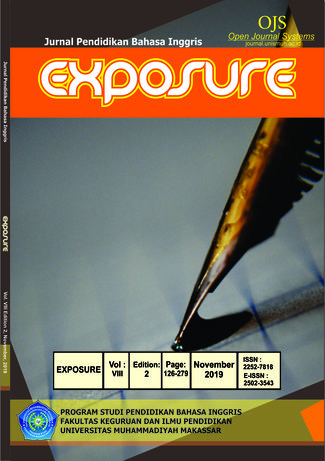A CONTINUUM ANALYSIS OF STUDENTS’ TRANSLATION SKILLS AT THE FIFTH SEMESTER OF ENGLISH DEPARTMENT MAKASSAR MUHAMMADIYAH UNIVERSITY
DOI:
https://doi.org/10.26618/exposure.v8i2.2073Keywords:
Translation, English, Continuum AnalysisAbstract
The objective of this research to identify students’ translation skills based on Continuum and to find out the students’ difficulties in translation at the fifth semester students English Department Makassar Muhammadiyah University. This research applied the descriptive qualitative research for the data collection by using translation paper test consisting 3 short paragraph with title “Food, Nutrition and Health” and an open-ended questionnaire consisting five numbers. The data was taken from 30 students in 10 class by using random sampling technique. The result of this research was in general the students have a good translation skills. Although the students result is not consistent yet. It can be seen from the students translation paper test result. The translation result understandable in some parts. Then the difficulties that students faced in translation are 2 aspects, first is diction and the second is meaning. They rarely choose appropriate words, because they took wrong word and also got the incorrect meaning. Besides the result from the translation paper test it can be seen in the questionnaire, there are some students stated that the difficulties in translation is the choose appropriate words.
References
Amaerita Yasminar. 2013. Analysis Of Translation Difficulties For The Fourth-semester students of English Department of IKIP Gunungsitoli. Institute of Teacher Training and education Gunungsitoli. Indonesia. (Accessed on February, 8th 2017)
Basri, D. 2016. Fundamental of Research Methodology. Makassar Muhammadiyah University. Makassar: Badan Penebit UNM.
Choliluddin. 2005. The Technique of Making Idiomatic Translation. Indonesia: Visipro.
Ghafar, M.N.A, 2015. Methodology in Behavioural Research. Malaysia: UTM press Malaysia
Ike Feni. 2007. Techniques For Translating English Sentences. English Education Study Programme Universitas Ahmad Dahlan. Yogyakarta (Accessed on February, 8th 2017)
John, W.C, 2012. Educational Research (Planning, conducting and evaluating Quantitative and Qualitative Research). USA: Pearson Education: United State of America.
Ba’dulu, Muis, 2004. Introduction to Linguistics. Makassar: Universitas Negeri Makassar.
Newmark Peter.1988. A Textbook of Translation. Shanghai Foreign Language Education.
Newmark Peter. 2001. Approaches to Translation. Pergamon Press
Sugiyono. 2012. Metode Penelitian Pendidikan Pendekatan Kuantitatif, Kualitatif, dan R&D. Bandung: ALFABETA. 2012 (cet. 15)
Downloads
Published
Issue
Section
License
Authors who publish with this journal agree to the following terms:
In order to assure the highest standards for published articles, a peer review policy is applied. In pursue of the compliance with academic standards, all parties involved in the publishing process (the authors, the editors and the editorial board and the reviewers) agree to meet the responsibilities stated below in accordance to the Journal publication ethics and malpractice statement.
Duties of Authors:
- The author(s) warrant that the submitted article is an original work, which has not been previously published, and that they have obtained an agreement from any co-author(s) prior to the manuscript’s submission;
- The author(s) should not submit articles describing essentially the same research to more than one journal;
- The authors(s) make certain that the manuscript meets the terms of the Manuscript Submission Guideline regarding appropriate academic citation and that no copyright infringement occurs;
- The authors(s) should inform the editors about any conflict of interests and report any errors they subsequently, discover in their manuscript.
Duties of Editors and the Editorial Board:
- The editors, together with the editorial board, are responsible for deciding upon the publication or rejection of the submitted manuscripts based only on their originality, significance, and relevance to the domains of the journal;
- The editors evaluate the manuscripts compliance with academic criteria, the domains of the journal and the guidelines;
- The editors must at all times respect the confidentiality of any information pertaining to the submitted manuscripts;
- The editors assign the review of each manuscript to two reviewers chosen according to their domains of expertise. The editors must take into account any conflict of interest reported by the authors and the reviewers.
- The editors must ensure that the comments and recommendations of the reviewers are sent to the author(s) in due time and that the manuscripts are returned to the editors, who take the final decision to publish them or not.
Authors are permitted and encouraged to post online a pre-publication manuscript (but not the Publisher’s final formatted PDF version of the Work) in institutional repositories or on their Websites prior to and during the submission process, as it can lead to productive exchanges, as well as earlier and greater citation of published work (see The Effect of Open Access). Any such posting made before acceptance and publication of the Work shall be updated upon publication to include a reference to the Publisher-assigned DOI (Digital Object Identifier) and a link to the online abstract for the final published Work in the Journal.

